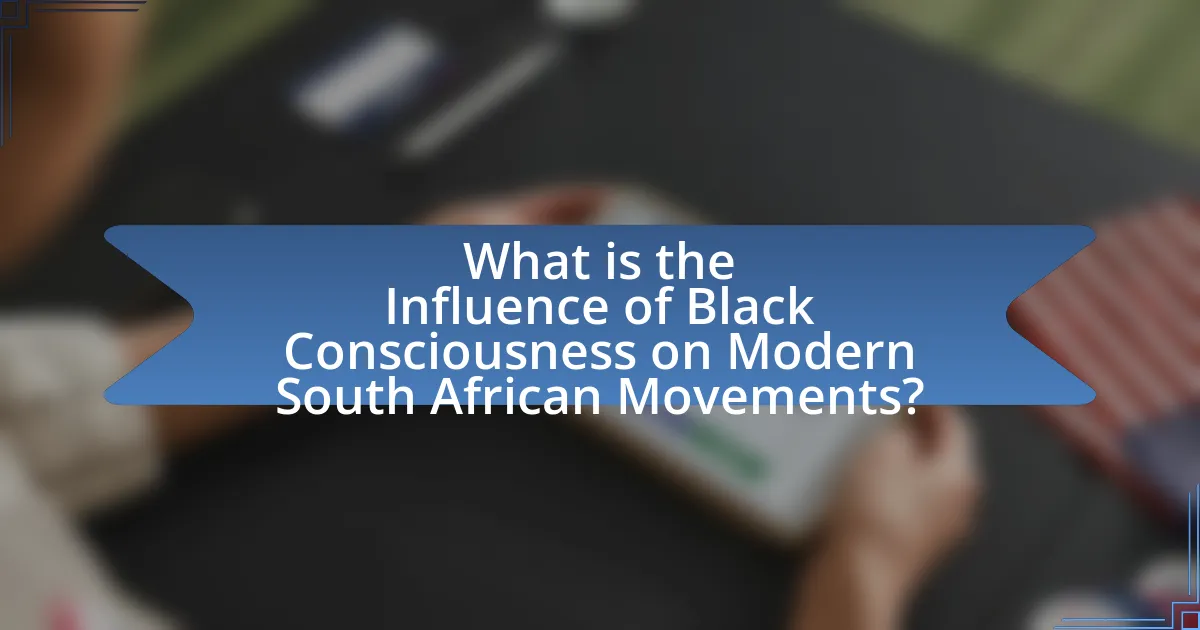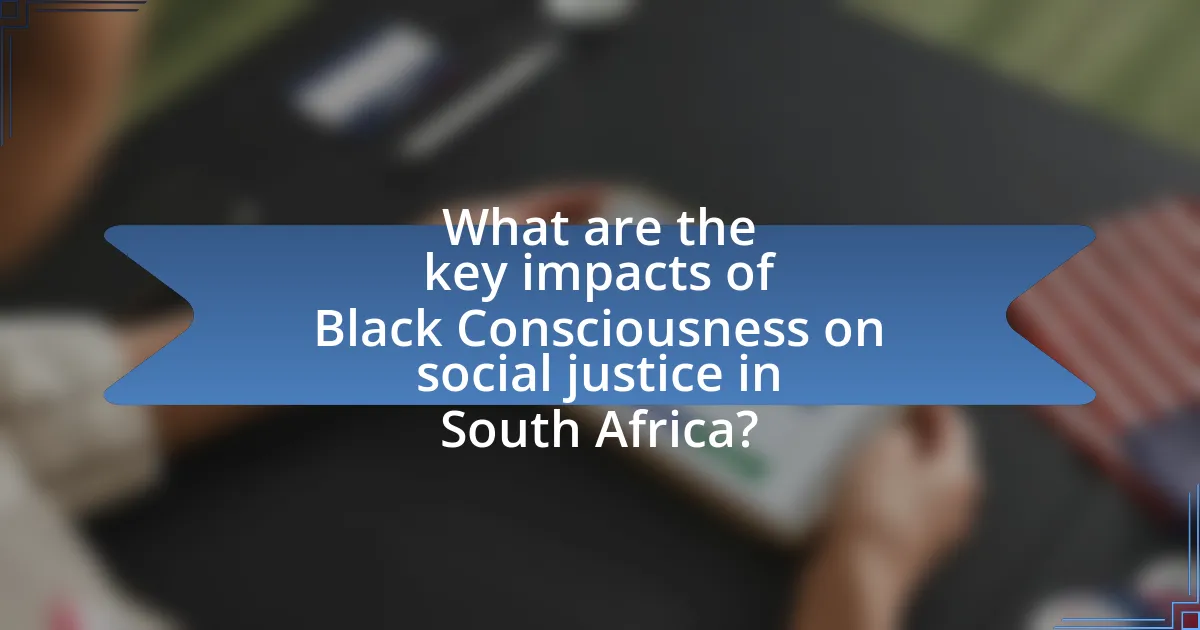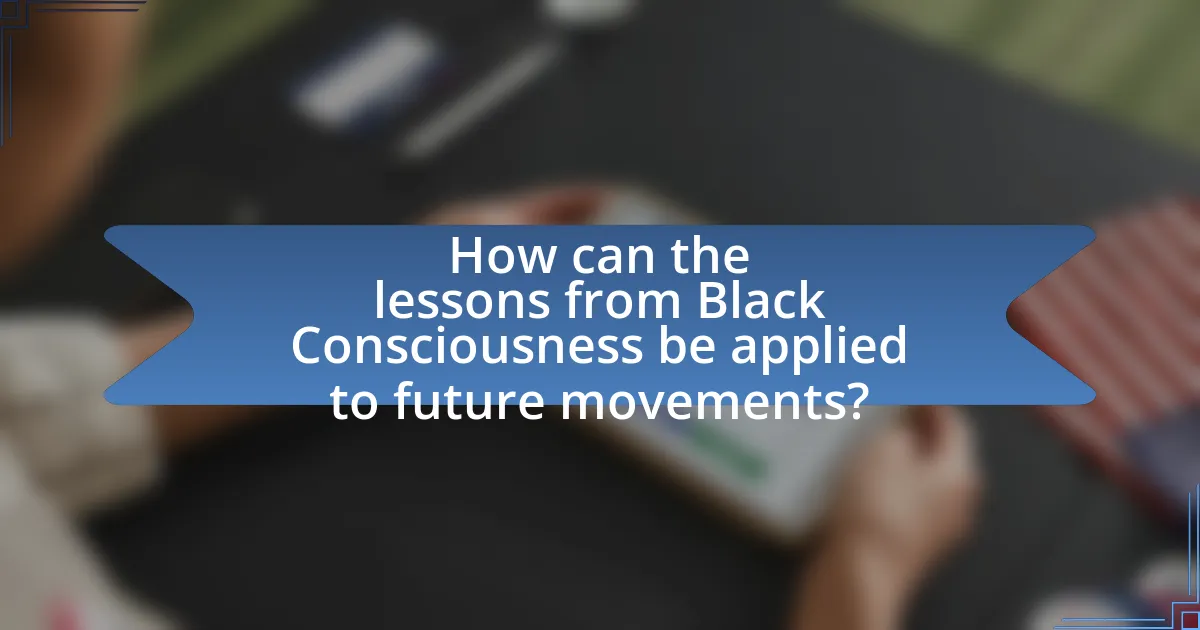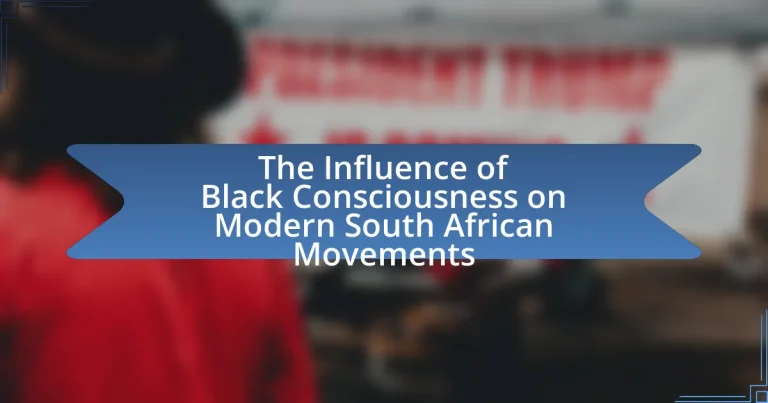The article examines the significant influence of Black Consciousness on modern South African movements, highlighting its foundational role in shaping contemporary activism. Originating in the 1960s under leaders like Steve Biko, Black Consciousness emphasizes self-reliance, pride in Black identity, and psychological liberation from oppression. The article explores the emergence of this movement, its core principles, key figures, and historical events that contributed to its formation. It also analyzes how Black Consciousness ideals resonate in current movements such as #FeesMustFall and the Economic Freedom Fighters, addressing social justice, educational reform, and systemic inequalities in South Africa. Additionally, the article discusses the challenges faced by these movements and the lessons that can be applied to future activism.

What is the Influence of Black Consciousness on Modern South African Movements?
The influence of Black Consciousness on modern South African movements is significant, as it has shaped the ideologies and strategies of contemporary activism. Black Consciousness, initiated by figures like Steve Biko in the 1960s, emphasized self-reliance, pride in Black identity, and the need for psychological liberation from colonial and apartheid oppression. This foundational philosophy has inspired movements such as the Fees Must Fall and #BlackLivesMatter South Africa, which advocate for social justice, educational reform, and anti-racism. The resurgence of Black Consciousness ideals in these movements is evident in their focus on empowering marginalized communities and challenging systemic inequalities, reflecting Biko’s assertion that “the most potent weapon in the hands of the oppressor is the mind of the oppressed.”
How did Black Consciousness emerge in South Africa?
Black Consciousness emerged in South Africa during the 1960s as a response to the oppressive apartheid regime and the psychological effects of colonialism. The movement was primarily led by figures such as Steve Biko, who emphasized the importance of self-identity and pride among black South Africans. Biko and his contemporaries sought to empower black individuals by promoting the idea that they should reject the inferiority imposed by apartheid and embrace their cultural heritage. This ideology gained traction through grassroots organizations like the South African Students’ Organization (SASO), which Biko co-founded in 1968, fostering a sense of unity and activism among black students. The movement’s influence was significant in mobilizing resistance against apartheid, culminating in widespread protests and contributing to the eventual dismantling of the apartheid system in the 1990s.
What historical events contributed to the formation of Black Consciousness?
The formation of Black Consciousness was significantly influenced by the apartheid system in South Africa, which institutionalized racial discrimination and oppression. Key events include the Sharpeville Massacre in 1960, where police killed 69 unarmed protesters, galvanizing anti-apartheid sentiments and highlighting the need for a unified Black identity. Additionally, the formation of the South African Students’ Organization (SASO) in 1968 by Steve Biko provided a platform for Black students to articulate their experiences and foster a sense of pride and solidarity. The Soweto Uprising in 1976, where students protested against the imposition of Afrikaans in schools, further emphasized the urgency for Black empowerment and consciousness. These events collectively contributed to the ideological foundation of Black Consciousness, promoting self-reliance and cultural pride among Black South Africans.
Who were the key figures in the Black Consciousness movement?
The key figures in the Black Consciousness movement include Steve Biko, who was a prominent leader and the movement’s most recognized face, advocating for psychological liberation and self-identity among black South Africans. Other significant figures include Mamphela Ramphele, who worked alongside Biko and contributed to the movement’s ideology, and Barney Pityana, who played a crucial role in organizing and mobilizing support. These individuals were instrumental in shaping the movement’s goals and strategies, emphasizing the importance of black pride and unity in the struggle against apartheid.
What are the core principles of Black Consciousness?
The core principles of Black Consciousness include the affirmation of Black identity, the rejection of oppression, and the promotion of self-reliance among Black people. These principles emphasize the importance of psychological liberation, encouraging individuals to recognize their worth and challenge the systemic inequalities imposed by apartheid in South Africa. The movement, founded by Steve Biko in the 1960s, aimed to empower Black South Africans by fostering a sense of pride and unity, which was crucial in mobilizing resistance against racial discrimination and advocating for social justice.
How does Black Consciousness define identity and self-worth?
Black Consciousness defines identity as a collective awareness and affirmation of Black people’s experiences, culture, and history, emphasizing the importance of self-definition and pride. This movement asserts that self-worth is rooted in recognizing one’s humanity and rejecting the dehumanizing narratives imposed by colonialism and apartheid. The philosophy promotes the idea that true self-worth comes from understanding and embracing one’s identity, leading to empowerment and social change. This is evidenced by the writings of Steve Biko, a key figure in the movement, who articulated that “the greatest weapon in the hands of the oppressor is the mind of the oppressed,” highlighting the necessity of mental liberation for establishing a positive self-identity and worth.
What role does community play in the philosophy of Black Consciousness?
Community plays a central role in the philosophy of Black Consciousness by fostering collective identity and empowerment among Black individuals. This philosophy, articulated by leaders like Steve Biko, emphasizes the importance of community in combating oppression and promoting self-awareness. The Black Consciousness Movement asserts that a strong sense of community is essential for psychological liberation and social change, as it encourages individuals to recognize their shared experiences and struggles. Historical context shows that community mobilization was pivotal during the anti-apartheid struggle, where collective action led to significant political and social transformations in South Africa.
How has Black Consciousness influenced contemporary movements in South Africa?
Black Consciousness has significantly influenced contemporary movements in South Africa by promoting a sense of identity and empowerment among black South Africans. This ideology, rooted in the 1960s and 1970s, emphasized self-reliance and pride in black culture, which has been echoed in modern movements such as the Economic Freedom Fighters (EFF) and the #FeesMustFall campaign. These movements advocate for social justice, economic equality, and educational reform, reflecting the foundational principles of Black Consciousness that challenge systemic oppression and advocate for the rights of marginalized communities. The legacy of leaders like Steve Biko continues to inspire activism that seeks to address inequalities and foster a collective identity among black South Africans.
What modern movements can trace their roots to Black Consciousness?
Modern movements that can trace their roots to Black Consciousness include the Economic Freedom Fighters (EFF) and the Black Lives Matter movement. The EFF, founded in 2013 by Julius Malema, emphasizes economic justice and the empowerment of black South Africans, reflecting the principles of Black Consciousness that advocate for self-reliance and dignity. Similarly, the Black Lives Matter movement, which gained prominence in the United States, draws on the ideas of Black Consciousness by addressing systemic racism and advocating for the rights and dignity of black individuals globally. Both movements embody the core tenets of Black Consciousness, which emphasize the importance of black identity, empowerment, and social justice.
How do these movements reflect the principles of Black Consciousness?
Modern South African movements reflect the principles of Black Consciousness by emphasizing self-identity, empowerment, and the rejection of oppression. These movements, such as the Economic Freedom Fighters and the #FeesMustFall campaign, advocate for the socio-economic rights of black South Africans, aligning with the Black Consciousness philosophy that promotes pride in black identity and the necessity of self-reliance. For instance, the #FeesMustFall movement directly challenges the systemic inequalities in education, echoing the Black Consciousness assertion that liberation must come from within the oppressed community. Additionally, the Economic Freedom Fighters’ focus on land reform and economic justice mirrors the Black Consciousness principle of addressing historical injustices and advocating for the rights of black individuals in a post-apartheid context.

What are the key impacts of Black Consciousness on social justice in South Africa?
The key impacts of Black Consciousness on social justice in South Africa include the empowerment of black identity, the promotion of self-reliance, and the mobilization of grassroots activism. Black Consciousness, articulated by leaders like Steve Biko, emphasized the importance of psychological liberation and cultural pride, which fostered a sense of agency among black South Africans. This movement catalyzed the formation of organizations such as the South African Students’ Organization (SASO), which played a crucial role in advocating for educational and political rights. The philosophy also influenced the anti-apartheid struggle by encouraging collective action and solidarity, ultimately contributing to the dismantling of apartheid policies and the establishment of a democratic society. The legacy of Black Consciousness continues to inform contemporary social justice movements in South Africa, emphasizing the need for equity and representation.
How has Black Consciousness shaped activism in recent years?
Black Consciousness has significantly shaped activism in recent years by fostering a renewed sense of identity and empowerment among marginalized communities in South Africa. This movement has inspired grassroots organizations and youth-led initiatives that focus on social justice, economic equality, and political representation. For instance, the #FeesMustFall movement, which emerged in 2015, drew heavily on Black Consciousness principles, advocating for accessible education and challenging systemic inequalities within the higher education system. Additionally, the resurgence of Black Lives Matter in South Africa has highlighted issues of police brutality and racial discrimination, echoing the foundational tenets of Black Consciousness that emphasize the importance of self-determination and collective action. These movements demonstrate how Black Consciousness continues to influence contemporary activism by encouraging solidarity and a critical examination of societal structures.
What strategies have modern movements adopted from Black Consciousness?
Modern movements have adopted strategies from Black Consciousness that emphasize self-identity, empowerment, and collective action. These strategies include promoting cultural pride, advocating for social justice, and fostering community solidarity. For instance, the Black Lives Matter movement draws on the principles of Black Consciousness by highlighting systemic racism and advocating for the rights and dignity of Black individuals. Additionally, contemporary South African movements, such as the Economic Freedom Fighters, utilize the rhetoric of Black Consciousness to challenge economic inequalities and assert the need for land reform. These movements reflect the enduring influence of Black Consciousness in their focus on identity politics and the mobilization of marginalized communities for social change.
How do these strategies address current social issues?
The strategies derived from Black Consciousness address current social issues by promoting self-identity, empowerment, and social justice among marginalized communities in South Africa. These strategies encourage individuals to recognize their worth and challenge systemic inequalities, which is crucial in a society still grappling with the legacies of apartheid. For instance, movements like #FeesMustFall and #BlackLivesMatter South Africa have utilized the principles of Black Consciousness to mobilize youth against educational inequities and police brutality, respectively. Research indicates that these movements have successfully raised awareness and prompted policy discussions, demonstrating the effectiveness of Black Consciousness in tackling contemporary social challenges.
What challenges do modern movements face in relation to Black Consciousness?
Modern movements face several challenges in relation to Black Consciousness, primarily including fragmentation, generational gaps, and the commercialization of activism. Fragmentation occurs as various groups prioritize different aspects of Black identity and social justice, leading to a lack of unified goals. Generational gaps create tensions, as younger activists may adopt different strategies and ideologies compared to older generations who were directly influenced by the original Black Consciousness Movement. Additionally, the commercialization of activism can dilute the core messages of Black Consciousness, as movements risk becoming co-opted by corporate interests that prioritize profit over genuine social change. These challenges hinder the effectiveness and cohesion of modern movements striving to uphold the principles of Black Consciousness.
How do internal divisions affect the effectiveness of these movements?
Internal divisions significantly undermine the effectiveness of movements influenced by Black Consciousness in South Africa. These divisions often lead to fragmented goals, reduced cohesion, and weakened collective action, which are essential for driving social and political change. For instance, the split between various factions within the African National Congress (ANC) and other organizations has historically resulted in conflicting strategies and priorities, diluting their overall impact. Research by scholars such as Steven Friedman highlights that internal conflicts can divert resources and attention away from critical issues, ultimately hindering the movement’s ability to mobilize support and achieve its objectives.
What external factors hinder the progress of movements inspired by Black Consciousness?
External factors that hinder the progress of movements inspired by Black Consciousness include systemic racism, economic inequality, and political repression. Systemic racism manifests through discriminatory laws and practices that marginalize Black communities, limiting their access to resources and opportunities. Economic inequality, evidenced by disparities in wealth and employment rates, restricts the ability of these movements to mobilize effectively and sustain their initiatives. Political repression, often seen in government crackdowns on protests and dissent, stifles the voices of activists and undermines their efforts to advocate for change. These factors collectively create an environment that challenges the advancement of Black Consciousness movements in South Africa.

How can the lessons from Black Consciousness be applied to future movements?
The lessons from Black Consciousness can be applied to future movements by emphasizing the importance of self-identity, collective action, and psychological liberation. Black Consciousness, as articulated by leaders like Steve Biko, highlighted the necessity for marginalized groups to recognize their worth and agency, which can inspire future movements to foster a strong sense of identity among their constituents. This approach encourages individuals to unite around shared experiences and goals, as seen in the anti-apartheid struggle, where collective action was pivotal in challenging systemic oppression. Furthermore, the psychological aspect of Black Consciousness underscores the need for mental emancipation, which can be crucial for future movements to combat internalized oppression and build resilience. Historical evidence shows that movements grounded in these principles, such as the Black Lives Matter movement, have effectively mobilized communities and raised awareness about social injustices, demonstrating the enduring relevance of Black Consciousness in contemporary activism.
What best practices can be derived from the Black Consciousness movement?
The Black Consciousness movement emphasizes the importance of self-identity and empowerment among marginalized communities. Best practices derived from this movement include fostering a strong sense of cultural pride, promoting education that highlights historical injustices, and encouraging grassroots organizing to address social issues. For instance, the movement’s focus on psychological liberation has led to initiatives that empower individuals to reclaim their narratives and challenge systemic oppression. Additionally, the movement’s strategies of solidarity and collective action have influenced contemporary movements in South Africa, such as the Fees Must Fall campaign, which advocates for accessible education. These practices demonstrate the effectiveness of community engagement and the necessity of addressing both psychological and material conditions for achieving social justice.
How can future movements ensure inclusivity and representation?
Future movements can ensure inclusivity and representation by actively engaging diverse communities in decision-making processes. This can be achieved through establishing platforms for marginalized voices, promoting equitable access to resources, and implementing policies that reflect the demographics of the population. For instance, the South African Constitution emphasizes equality and non-discrimination, which serves as a legal framework for movements to advocate for inclusive practices. Additionally, research shows that movements that incorporate a wide range of perspectives are more effective in addressing systemic issues, as evidenced by the success of the Black Consciousness Movement in uniting various groups against apartheid.
What role does education play in perpetuating the ideals of Black Consciousness?
Education plays a crucial role in perpetuating the ideals of Black Consciousness by fostering critical awareness and cultural identity among Black individuals. Through curricula that emphasize African history, literature, and philosophy, educational institutions can instill a sense of pride and empowerment, which are central tenets of Black Consciousness. For instance, the incorporation of figures like Steve Biko, who advocated for self-awareness and the importance of Black identity, into educational materials reinforces these ideals. Studies have shown that education that highlights the contributions and struggles of Black people can lead to increased political engagement and social activism, as seen in contemporary movements in South Africa that draw inspiration from Black Consciousness principles.
What practical steps can activists take to embody the principles of Black Consciousness today?
Activists can embody the principles of Black Consciousness today by promoting education that emphasizes African history, culture, and identity. This approach fosters a sense of pride and awareness among individuals within the community, countering historical narratives that have marginalized Black experiences. For instance, initiatives like community workshops and educational programs can be implemented to teach the significance of Black history and the contributions of African leaders.
Additionally, activists can engage in grassroots organizing to address social and economic injustices faced by Black communities. This includes advocating for policies that support equitable access to resources, healthcare, and education. Research shows that community-led movements, such as the Fees Must Fall movement in South Africa, have successfully highlighted issues of inequality and mobilized collective action for change.
Furthermore, building alliances with other marginalized groups can strengthen the fight against systemic oppression, creating a united front that amplifies the voices of those affected. By fostering solidarity, activists can work towards dismantling the structures that perpetuate inequality, aligning with the core tenets of Black Consciousness that emphasize collective empowerment and self-determination.
How can individuals contribute to the legacy of Black Consciousness in their communities?
Individuals can contribute to the legacy of Black Consciousness in their communities by actively promoting education and awareness about its principles and history. Engaging in discussions, workshops, and community events that highlight the significance of Black Consciousness fosters understanding and appreciation among diverse groups. For instance, the Black Consciousness Movement, founded by Steve Biko in the 1960s, emphasized self-reliance and pride in Black identity, which can be echoed in local initiatives that celebrate cultural heritage and address social injustices. By organizing or participating in these initiatives, individuals help sustain the movement’s ideals, ensuring they remain relevant and impactful in contemporary society.
What resources are available for those looking to engage with Black Consciousness principles?
Books, articles, and online platforms are key resources for engaging with Black Consciousness principles. Notable books include “Black Consciousness in South Africa” by Steven Biko, which outlines the philosophy and its impact on society. Academic journals such as the “Journal of Black Studies” publish research on Black Consciousness and its relevance today. Online platforms like the Black Consciousness Movement’s official website provide access to historical documents, speeches, and contemporary discussions. These resources collectively offer a comprehensive understanding of Black Consciousness and its influence on modern South African movements.


